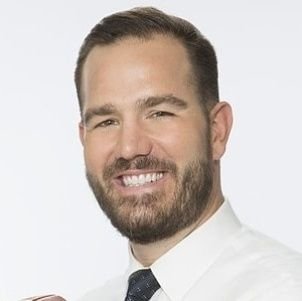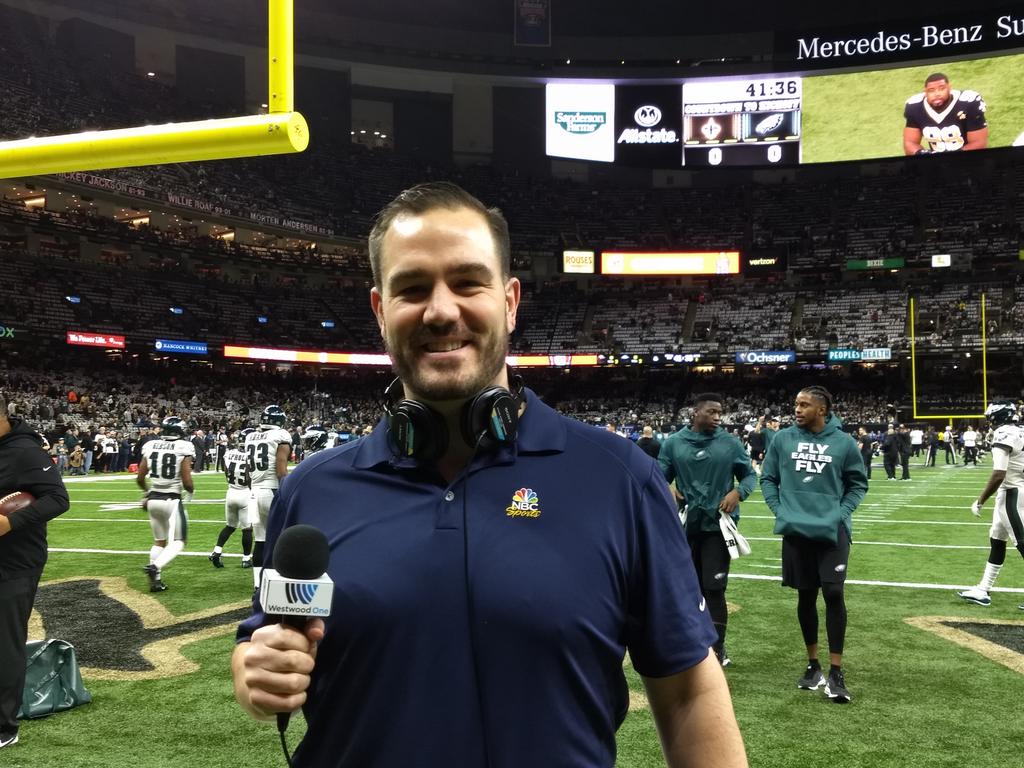The diagnosis wasn’t what Ross Tucker was hoping for. He had just received the news that an injury in a NFL preseason game against the Baltimore Ravens had left him with a herniated disk in his neck that had bruised his spinal cord. He pondered what to do next, even though he had already beaten the odds as a former Ivy League star that enjoyed seven years in the NFL. Tucker looked up at the doctor and calmly asked what he should do next. The answer was sharp and to the point.

“I think you’re 28 and you went to Princeton,” the doctor said. “You should get a real job.”
Tucker still laughs he was told that in 2007 and never took it to heart. Instead of doing something like finding a real job, Tucker, instead, finds himself at places such as Ralph Wilson Stadium in Buffalo doing radio color commentary for NFL playoff games like he was on Saturday. Playing in the NFL was a dream for him, but sports media has always been his dream job. He’s blessed that not one, but two, dreams have come true in his professional life.
“Most people don’t have their dream come true,” said Tucker. “Sometimes I feel guilty because I had both of my dream jobs come true.”
But neither of them almost happened. That’s because the Princeton grad initially accepted a job with Lehman Brothers on Wall Street during his senior year of college. He thought, well, If my parents paid for IVY League, I might as well make a lot of money. But then fate intervened with a long NFL career. The once short and chubby kid who thought his ticket into sports was being a broadcaster, was now being paid to play at the highest level.
“For most guys it’s all about playing and then, all right, I guess I’ll get into the media now,” Tucker said. “I actually think I gave up playing in the NFL in the sixth grade, because I was a chubby kid. I thought, well, that’s not going to happen. I’m going to have to be like my dad and be a broadcaster.”
Even though Tucker was going through the grueling nature of being an NFL offensive lineman, his dream of being in sports media was never totally out of sight. He was still the same guy that grew up dreaming about writing for Sports Illustrated and calling football games in the booth. So, as he saw his career winding down, he decided to take action. During his last year in the NFL in 2007, the league introduced a Broadcast Boot Camp with NFL Films and the Players Association. Tucker pounced at the opportunity. He instantly made contacts with Howie Deneroff, his current boss at Westwood One and Steve Cohen with Sirius XM, who was his boss for over 11 years.
“I came away from it thinking, man, I love this,” Tucker said. “I have to do this.”

But Tucker also realized he wasn’t a future Hall of Famer or even a perennial Pro Bowler that seemingly automatically gets the color commentator gig for a major network as soon as they retire. Instead, he found a different area of sports media that had been previously untapped by former players.
“My big takeaway was that no former players were writing,” Tucker said. “A lot of guys could do 15-second spurts on TV or even the radio side of things, but nobody wanted to write. I remember thinking I had to write 20-page papers on Machiavelli and a 128-page senior thesis on Title 9. I could easily write a 1,000 words on what it’s like to be at the bottom of a pile when there’s a fumble.”
Princeton may have not prepared him for sports media, but it gave him the writing skills he needed to break through. His idea was sound and made a whole lot of sense, but he didn’t know the right person to help make it happen.
That changed one afternoon at Redskins Park. Well-known NFL writer Peter King was at the team facility that day and Tucker took notice. He knew King was the perfect person to help push his idea through and get him started. But in a strange turn of events, it was the athlete, not the writer, that was nervous about introducing himself. Tucker took three steps towards his car and stopped.
“I thought, no, I’m going to introduce myself and tell him my idea,” Tucker said. “I walked back into the building and into the media room, which players didn’t do. I told him I read him every Monday and wanted to write. He loved it.”
From there, King was very much a mentor to Tucker. So much so, that he let Tucker write the “Monday Morning Quarterback” column for the September 2007 Sports Illustrated issue all about his career being over. Comcast read the article and soon showed interest in using Tucker’s services, as well as other media outlets. Make no mistake about it, King’s gesture helped fuel Tucker’s sports media career.
But as things go in sports media, Tucker’s early gigs weren’t paying enough to even cover the gas needed to drive to his new opportunities. He drove from his home in Central Pennsylvania to Philadelphia, two hours each way, for a show on Comcast Sports Philadelphia that paid him 100 bucks. At the same time, he was doing radio color commentary for Princeton football for 150 bucks a game. His mile reimbursement for road games was often higher than his actual game check.
But after two years of grinding in his dream job, ESPN came calling with a deal he couldn’t turn down. The network wanted to hire him to write and host their daily football podcast. This was what he was working for. This was it. But there was one problem.
“At the time, I promise you, I had no idea what a podcast was,” laughed Tucker. “None whatsoever. This is 2009 and all I knew was that they were going to pay me to talk football.”
Hosting the podcast was one of the best things that’s ever happened in his sports media career. After growing the audience for three years at ESPN, he eventually went out on his own and started the Ross Tucker Football Podcast. Tucker was able to bring over the large audience to his own podcast network in 2013, where he still does a 30-minute show, five days a week.
The show has grown into one of the best and most successful football podcasts on the internet, featuring sponsors such as DraftKings, 1-800-Flowers and many more. Most of his clients have been with him since day one because of his willingness and ability to create a relationship with his business partners.
“I’m proud because it’s not easy to grow like we have the past seven years,” Tucker said. “Most podcasts in the Top 20 are affiliated with a major network. It’s not as easy to grow as an independent. But the biggest key for me has been consistency. I think that’s what’s really helped our growth.”
Along with putting out 200 Ross Tucker Football podcasts a year, Tucker co-hosts weekly shows like Even Money, Fantasy Feast and the College Draft as part of his podcast network. In addition, he’s also a game analyst for the Philadelphia Eagles, CBS Sports and Westwood One, as well as a host on Bet Sweats for Radio.com and Entercom. He’s even still active in writing and one can read him on The Athletic.

Tucker has always felt blessed, and judging by his resume, he should be. But this year more than ever, he’s just thankful to be in the position he’s in. Maybe it’s because, with the uncertainty of 2020, he had no idea how many games he would actually get to call, but sitting in the radio booth of Ralph Wilson Stadium last Saturday gave him a bittersweet feeling. He felt incredibly lucky to be able to witness the Bills clinch a spot in the AFC Championship Game and do 26 football games, split evenly between college football and NFL, but there was a sadness to it being his final game of the year in the booth.
“There’s nothing like being in the booth,” Tucker said. “I have the greatest affinity for the Bills. I played for five teams and had the best experience there. It’s a very special place for me. I got a text message Saturday from a teammate Saturday saying ‘I’m so glad you got to be there for this.’ He was just glad somebody from our era was there. And that was the loudest 6,700 people I have ever heard in my life.”
From laughing in the booth at Daniel Jones tripping, to openly being upset about Jaret Patterson at Buffalo U being snubbed at a chance to break the single-game rushing and touchdown record, Tucker doesn’t hide his emotions on the broadcast. And he shouldn’t, because it’s his single best quality as a broadcaster.

Thank God for Peter King.
Tyler McComas is a columnist for BSM and a sports radio talk show host in Norman, OK where he hosts afternoon drive for SportsTalk 1400. You can find him on Twitter @Tyler_McComas or you can email him at TylerMcComas08@yahoo.com.







